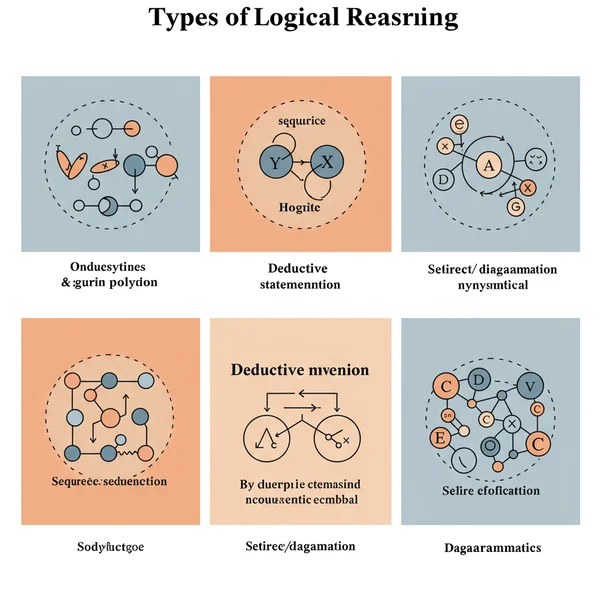Aptitude Test: Master Logical Reasoning & Succeed
August 4, 2025 | By admin
Are you preparing for an upcoming job interview or career assessment? If so, you'll likely encounter a logical reasoning aptitude test. Many job seekers, students, and career changers find these assessments challenging, but they are a crucial step in demonstrating your analytical abilities to potential employers. Are you facing a logical reasoning aptitude test soon? This guide is your roadmap to success. We will break down what these tests involve, provide effective strategies, and share tips to help you ace your next assessment and unlock your true potential.
Logical reasoning tests are designed to evaluate your problem-solving skills and your ability to think critically under pressure. These tests aren't about what you know; they're about how you think. By understanding their structure and practicing with the right tools, you can turn this challenge into an opportunity. To get a feel for what to expect, you can try our free tool and see how you measure up.

Understanding Logical Reasoning Tests
Before you can succeed, you need to understand the fundamentals of a logical reasoning test. These assessments are a standard component of many pre-employment screening processes because they are powerful predictors of job performance. They give employers a standardized way to measure a candidate's cognitive abilities, which are essential for navigating complex tasks and making sound decisions in the workplace.
These tests are rooted in psychometric science, ensuring they are both valid and reliable measures of your skills. They present you with unfamiliar information and ask you to draw logical conclusions, identify patterns, or evaluate arguments. The key is not prior knowledge of the subject matter, but your innate ability to reason and analyze information presented to you.
Assessing Your Cognitive Abilities
So, what do these tests actually measure? A logical reasoning test is a type of cognitive aptitude test that aims to evaluate a range of your core mental skills. Employers use them to gauge your ability to work flexibly with new information, process complex problems, and make judgments without personal bias. These are highly sought-after skills in almost every industry and role.
Key competencies measured include:
-
Problem-Solving: Your capacity to identify the core components of a problem and develop effective solutions.
-
Critical Thinking: Your ability to evaluate information objectively and make a reasoned judgment.
-
Pattern Recognition: Your skill in spotting trends, sequences, or relationships within data or shapes.
-
Deductive and Inductive Reasoning: Your ability to draw specific conclusions from general principles or, conversely, formulate general principles from specific observations.

Exploring Basic Question Formats
To prepare effectively, you need to know what are basic aptitude questions. While formats vary, most logical reasoning tests include a few common types. Familiarizing yourself with these will significantly boost your confidence and performance.
- Inductive Reasoning: These questions provide a series of specific examples (like numbers or shapes) and ask you to identify the underlying pattern to determine the next item in the sequence. They test your ability to move from specific observations to a general conclusion.
- Deductive Reasoning: Often presented as syllogisms, these questions give you a set of general statements (premises) and ask you to determine which conclusion logically follows. This assesses your ability to apply a general rule to a specific instance.
- Abstract or Diagrammatic Reasoning: This format uses shapes and symbols instead of words or numbers. You'll be asked to identify the relationship between a series of figures to find the missing piece or the next in the sequence.
The best way to get comfortable with these formats is to practice. Taking an online aptitude test allows you to experience these question types firsthand.
Effective Aptitude Test Practice Strategies
Success in a logical reasoning test doesn't come from last-minute cramming. It comes from consistent and smart aptitude test practice. Developing a structured approach will help you build not just accuracy, but also the speed required to complete the test within the time limits. A solid preparation plan is your best asset.
Remember, the goal of practice is not just to get questions right, but to understand the logic behind them. This deeper understanding will allow you to tackle unfamiliar problems on the actual test day. Our platform is designed to provide a comprehensive job aptitude test experience, helping you pinpoint and strengthen your weak spots.
Building a Solid Preparation Routine
If you're wondering how do I prepare for an aptitude test?, the answer is to create a consistent routine. Sporadic practice is far less effective than regular, focused sessions. Here’s a simple but powerful routine to follow:
-
Familiarize Yourself with the Test: Before you begin, understand the test format, the number of questions, and the time limit. Knowing what to expect reduces anxiety.
-
Practice Consistently: Dedicate short, regular blocks of time to practice. Even 20-30 minutes a day is more effective than a single long session once a week.
-
Simulate Real Test Conditions: As you get more comfortable, start timing yourself. This helps you learn to manage pressure and pace yourself effectively. You can practice your skills on our platform to get used to timed environments.
-
Review and Reflect: This is the most crucial step. After each practice test, thoroughly review your answers—especially the incorrect ones. Focus on understanding the logic behind the correct solution so you don't repeat the same mistakes.

Mastering Key Tips and Techniques
Beyond practice, there are several logical reasoning tips that can give you an edge. These techniques help you work more efficiently and accurately, maximizing your score.
- Read the Instructions Carefully: Don't rush. Misreading a question or its instructions is a common and avoidable error.
- Use the Process of Elimination: If you're unsure of the correct answer, start by eliminating the options you know are incorrect. This significantly increases your odds of choosing the right one.
- Don't Get Bogged Down: Every question is typically worth the same number of points. If you're stuck on a difficult one, make an educated guess, mark it for review if possible, and move on.
- Identify Keywords and Triggers: In verbal reasoning questions, words like "all," "some," "none," "always," and "never" are critical. Pay close attention to them as they define the logical scope of the statement.
Why Critical Thinking is Your Ultimate Edge
While logical reasoning tests seem specific, the skill they measure—critical thinking—is one of the most valuable assets you can possess in your professional life. Employers aren't just looking for people who can pass a test; they're looking for individuals who can think on their feet, solve complex problems, and make intelligent decisions.

Developing your critical thinking skills means you're not just preparing for a test; you're investing in your long-term career growth. It’s the ability to step back, analyze a situation from multiple angles, and come to a well-reasoned conclusion. This skill is indispensable, whether you're a recent graduate or a seasoned professional looking to advance. A career assessment aptitude test can provide excellent insights into your current abilities.
Sharpening Your Problem-Solving Skills
Your analytical mindset is a muscle that grows stronger with exercise. You can sharpen your problem-solving skills both on and off testing platforms. Engage in activities that challenge your brain, such as solving puzzles, playing strategy games, or even debating topics with friends while focusing on logical arguments.
When you take a practice test, approach each question as a unique puzzle. Break it down into smaller parts. Identify the given information, the question being asked, and the potential paths to a solution. This methodical approach not only helps you find the answer but also trains your brain to think more analytically in all situations.
Leveraging Logic in Your Career
The skills you hone while preparing for your aptitude test have direct applications in the workplace. A marketing manager uses logical reasoning to analyze campaign data and predict consumer behavior. An engineer uses it to troubleshoot a complex system failure. A project lead uses it to anticipate risks and allocate resources effectively.
By performing well on a logical reasoning test, you send a clear signal to employers that you have the cognitive foundation to excel in your role. It proves you are an agile thinker who can adapt to new challenges and contribute meaningfully to the team's success. Your test results can be a powerful testament to your potential.
Ready to Unlock Your Potential?
Mastering the logical reasoning aptitude test is an achievable goal that opens doors to incredible career opportunities. By understanding what these tests measure, engaging in effective practice, and sharpening your critical thinking, you can approach any assessment with confidence. This journey isn't just about a score; it's about cultivating a core skill that will serve you throughout your professional life.
Don't leave your success to chance. Take control of your preparation today. Start by discovering your baseline, identifying your strengths, and uncovering areas for growth. Take our free aptitude test now to receive instant results and see how our detailed AI-powered reports can guide you toward realizing your full capabilities!
Common Questions About Logical Reasoning Aptitude Tests
Is a logical reasoning aptitude test hard?
They can certainly be challenging, especially due to the strict time constraints and abstract nature of the questions. However, their difficulty is significantly reduced with preparation. Familiarity with the question types and consistent practice make them much more manageable.
Can you study for a logical reasoning test?
Absolutely. While you don't "study" in the traditional sense of memorizing facts, you prepare by practicing question formats, learning time-management strategies, and honing your analytical skills. Consistent aptitude test practice is the most effective form of studying for these assessments.
What does a logical reasoning test measure?
A logical reasoning test measures your innate ability to analyze information, recognize patterns, solve problems, and draw sound conclusions. It's a direct assessment of your critical thinking and fluid intelligence, which are key indicators of your potential to succeed in a new role.
What happens if I struggle with a logical reasoning test?
Struggling with a test is not a failure; it's a valuable learning opportunity. It highlights specific cognitive areas where you can improve. On our platform, you can not only practice but also opt for an in-depth AI report that explains your challenges and provides actionable advice for growth. Discover your results to turn your struggles into strengths.